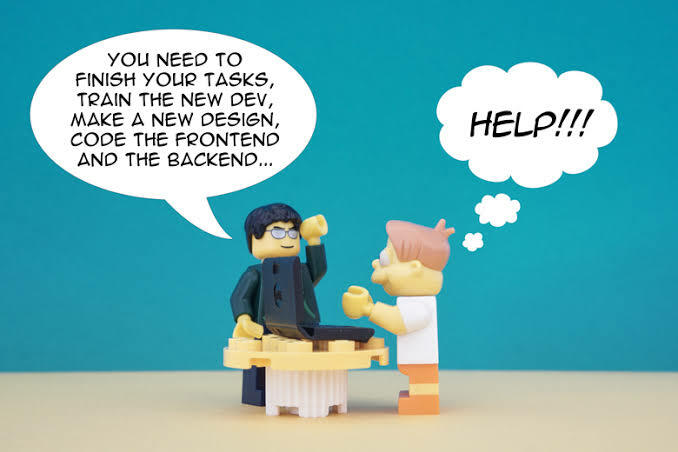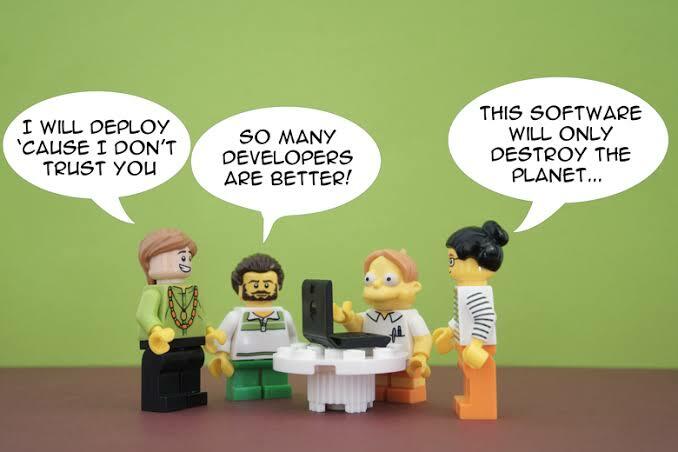21
Tips To Avoid Developer Burnout Like a Pro
Are you properly handling the stress in your dev life right now?
Being stressed out because you have pending code to write or not being able to stare at your IDE for longer than 10 minutes without tabbing out and browsing the Web — are both symptoms of developer burnout. In other words, you’ve spent so much of your energy coding that you no longer can stand it.
This happens to all of us senior and junior devs alike. It’s the problem of having a job that sometimes is also a hobby. When that happens, you love coding so much that you spend nine hours working on it and then a few extra working on your personal projects.
Don’t worry though — at least not too much — because there are ways to avoid burnout. You just have to understand what you’re going through first.
Don’t worry though — at least not too much — because there are ways to avoid burnout. You just have to understand what you’re going through first.

For you to understand how to avoid it, you first need to understand where it comes from. Burnout comes from spending too much energy on a single activity, which in turn affects every other aspect of your life. It’s that simple.
That can be seen in many ways, for instance, making coding the only activity you do your entire day. When you spend 12 to 18 hours a day coding, what else do you have time for? Other than eating and sleeping, I mean?
Or, perhaps only focusing on coding, even when you’re not writing code. Reading about coding, coding techniques, new frameworks, other languages. While you’re not actively writing code when doing any of these things, you’re still only focusing on a single task. Your mind is unable to break from the coding state of mind. Even if you’re not consciously thinking about them, your coding blockers (pending tasks on your daily job, future features you’re trying to implement on your pet project, new frameworks you’ve been dying to learn but haven’t had the time for) are adding to your stress and anxiety.
Or, perhaps only focusing on coding, even when you’re not writing code. Reading about coding, coding techniques, new frameworks, other languages. While you’re not actively writing code when doing any of these things, you’re still only focusing on a single task. Your mind is unable to break from the coding state of mind. Even if you’re not consciously thinking about them, your coding blockers (pending tasks on your daily job, future features you’re trying to implement on your pet project, new frameworks you’ve been dying to learn but haven’t had the time for) are adding to your stress and anxiety.
You can tell yourself you’re doing it for a reason but no matter how noble that reason might be, you’ll end up burning out. Even if your mind resists it, your body will yield. You’ll start seeing physical problems such as losing (or graying) hair, stomach issues, upper back or neck pains due to strained muscles. These are all symptoms burned out developers feel. I know because I’ve felt them myself.
Stop coding. That’s the first step.
Not entirely of course, but give yourself a fixed time window in which you’re allowed to code. Then stop.
And by “stop” I mean it. Close your IDE, stop Googling for a solution, and making notes for tomorrow. It’s “you” time now.
I don’t care if you love coding. You are not a code-writing machine, you’re a person, and we humans need more than one thing in our lives. You need interaction with other people or activities that will keep your mind off of coding.
Not entirely of course, but give yourself a fixed time window in which you’re allowed to code. Then stop.
And by “stop” I mean it. Close your IDE, stop Googling for a solution, and making notes for tomorrow. It’s “you” time now.
I don’t care if you love coding. You are not a code-writing machine, you’re a person, and we humans need more than one thing in our lives. You need interaction with other people or activities that will keep your mind off of coding.

If you’re not a social person, playing games can also help.But, please don't play a game you developed, if not you will get disturbed is there are any bugs in the game play.
Find one that speaks to you and captures your attention, then dive right into it. Mind you, don’t change one burnout for the other, but try to balance your gaming time within your day. Maybe spend one or two hours after work as a way to help your mind make the context switch into not thinking about code anymore.
And if you are a social person, you can still implement gaming with friends (especially now that we’re all isolated) through online gaming. Use voice chat to pretend you’re all sitting together; that also adds a lot to the experience and allows you to have an actual conversation about other people’s interests. It’ll force you to stop thinking about your code and think about something completely different.
And if you are a social person, you can still implement gaming with friends (especially now that we’re all isolated) through online gaming. Use voice chat to pretend you’re all sitting together; that also adds a lot to the experience and allows you to have an actual conversation about other people’s interests. It’ll force you to stop thinking about your code and think about something completely different.
While they’re not the same type of activity, they both contribute in the same way: they take you out of your world and put you into a different one. If you’re more into “not thinking and letting others do the work for you,” then a movie is a great escape ( I personally love watching movies to forget about work problems).
If, on the other hand, you have the time to read a book, then it’ll have the same effect. It’ll take you out of your house and into a completely different world where your problems (and your context) don’t exist. You’ll spend a few hours completely unaware of whatever is causing the burnout. You’ll feel refreshed and re-invigorated once you’ve closed that book for the day.
If, on the other hand, you have the time to read a book, then it’ll have the same effect. It’ll take you out of your house and into a completely different world where your problems (and your context) don’t exist. You’ll spend a few hours completely unaware of whatever is causing the burnout. You’ll feel refreshed and re-invigorated once you’ve closed that book for the day.
If you can, leave your house. But if you can’t, a video call or even a phone call will do. Talk to other people and actively listen to them. Making a call “because you have to” and then going back to coding will not have any positive effect. Instead, spend some time having a conversation about life, about problems, or about anything that is not work-related. Something as simple as that will help you get your mind off whatever is causing your burnout.
Funny story, I didn’t know how to finish this article, and I had been writing since 4 a.m., so I left for a walk right at this point. It was a beautiful day, so my wife and I went for a walk. We picked up my kids from school, spent some time with them, and in the end, it was too late for me to go back to writing. It’s the next day now, my mind is fresher, and I know how to move forward. I could’ve stressed out about the fact that I couldn’t finish this story yesterday, but instead, I gave myself time. That’s the whole point of taking a break.


Look, I get it, I love using Twitter, Clubhouse & LinkedIn, and I’m sure you have your favorite social media platform, but you need to stop using them from time to time. Some people even recommend uninstalling these apps from your mobile devices, so you can remove the notifications-related anxiety from your life. This is great if you notice that your social media activity is 100% related to your burnout. If you’re getting burned out because you have an open source project that’s getting lots of activity online, then your phone is probably buzzing with updates. Stop it. You can’t unplug if you’re constantly reminded about it.

In the same vein as the social media app removal, if it’s work that’s causing your burnout, unplug from it. That means turning off email and slack (or whatever combination you might have) notifications, or even if you have a dedicated work phone, turn it off if you can. If you’re not meant to be working, you should not be looking at work-related notifications. That’s the rule you need to live by.


That’s the mantra you need to keep in the back of your mind. That problem you’ve been trying to solve for the past five days? It can wait a few more hours. Take a break. That new release of your framework? It can wait a little longer. Spend some time with your family. That email you started writing three times but got interrupted? It can wait; it’s “you” time. Go read a book.
Once you accept the fact that everything but your health can wait, then taking a break becomes slightly easier.
Once you accept the fact that everything but your health can wait, then taking a break becomes slightly easier.
What are you doing to lower or avoid your own burnout? How are you handling stress during the pandemic? Share your experience with others in the comments.

21
